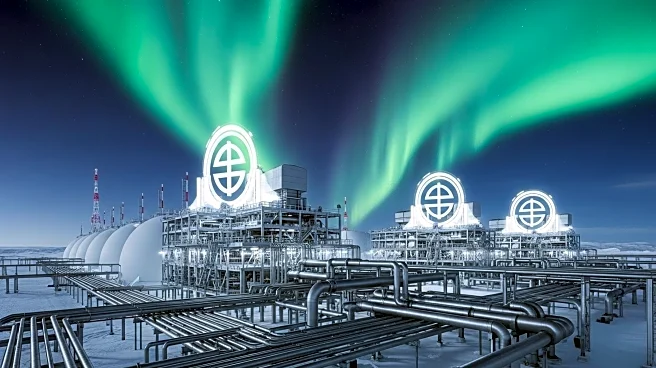What's Happening?
Russian gas producer Novatek has successfully advanced its Arctic LNG 2 project in the Siberian Arctic, despite facing Western sanctions. The project, which involves assembling the facility in three sections on floating concrete pontoons, was initially disrupted by sanctions following Russia's invasion of Ukraine in 2022. These sanctions delayed the installation of the second train due to export bans on essential parts from Western suppliers. However, with significant support from Chinese state-owned enterprises, which hold a 20% stake in the project, the second train began operations recently. Chinese gas companies, attracted by discounted prices, remain the plant's primary customers, undeterred by potential American sanctions. The LNG carrier Arctic Vostok recently delivered the plant's seventh cargo to Beihai, China, marking a significant milestone as the winter ice season approaches.
Why It's Important?
The operation of the Arctic LNG 2 plant highlights the geopolitical complexities surrounding energy production and trade. Despite Western efforts to isolate Russia economically, the involvement of Chinese interests underscores the shifting alliances and economic dependencies in the global energy market. This development could potentially weaken the impact of Western sanctions, as Russia finds alternative markets and partners. For the U.S. and its allies, this situation presents a challenge in maintaining the effectiveness of sanctions as a tool for geopolitical influence. Additionally, the continued operation of the plant may affect global LNG supply dynamics, potentially influencing prices and availability in various markets.
What's Next?
As the winter ice season in the Russian Arctic approaches, the Arctic LNG 2 plant may face operational challenges, potentially halting shipments until conditions improve. Novatek's plans to expand the shipping window by building a fleet of icebreaking LNG carriers have been stalled due to sanctions, affecting future logistics. The ongoing legal and contractual disputes between Russian and South Korean shipbuilders further complicate the situation. Stakeholders will be closely monitoring the plant's output and the geopolitical implications of its continued operation, particularly in relation to U.S.-China relations and the broader energy market.
Beyond the Headlines
The Arctic LNG 2 project raises questions about the long-term sustainability of energy projects in politically sensitive regions. The reliance on Chinese support highlights the strategic importance of energy resources in international relations and the potential for new alliances to form in response to geopolitical pressures. The situation also underscores the resilience of energy markets and the adaptability of companies like Novatek in navigating complex regulatory and political landscapes.











